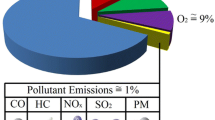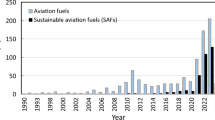Abstract
Diesel engines have proven their utility in the transportation, agriculture, and power sectors in India. They are also potential sources of decentralized energy generation for rural electrification. Concerns on the long-term availability of petroleum diesel and the stringent environmental norms have mandated the search for a renewable alternative to diesel fuel to address these problems. Vegetable oils have been considered good alternatives to diesel in the past couple of years. However, there are many issues related to the use of vegetable oils in diesel engine. Jatropha curcas has been promoted in India as a sustainable substitute to diesel fuel. This study aims to develop a dual fuel engine test rig for evaluating the potential suitability of Jatropha oil as diesel fuel and for determining the performance and emission characteristics of an engine with Jatropha oil. The experimental results suggest that engine performance using Jatropha oil is slightly inferior to that of diesel fuel. The thermal efficiency of the engine was lower, while the brake-specific fuel consumption was higher with Jatropha oil compared with diesel fuel. The levels of nitrogen oxides (NOx) from Jatropha oil during the entire duration of the experiment were lower than those of diesel fuel. The reduction of NOx was found to be an important characteristic of Jatropha oil as NOx emission is the most harmful gaseous emission from engines; as such, its reduction is always the goal of engine researchers and makers. During the entire experiment, carbon monoxide (CO), hydrocarbon (HC), and carbon dioxide (CO2) emissions in the case of using Jatropha oil were higher than when diesel fuel was used. The higher density and viscosity of Jatropha oil causes lower thermal efficiency and higher brakespecific fuel consumption. The performance and emission characteristics found in this study are significant for the study of replacing diesel fuel from fossils with Jatropha oil in rural India, where the availability of diesel has always been a problem.
Similar content being viewed by others
References
BP Statistical Review of World Energy, British Petroleum, June 2009.
A. Srivastava and R. Prasad, Triglycerides-based diesel fuels, Renewable and Sustainable Energy Reviews, 4 (2000) 111–133.
J. Narayana Reddy and A. Ramesh, Parametric studies for improving the performance of a Jatropha oil-fuelled compression ignition engine, Renewable Energy, 31 (2006) 1994–2016.
P. Purohit and A. Michaelowa, CDM potential of SPV pumps in India, Renewable and Sustainable Energy Reviews, 12(1) (2008) 181–199.
A. M. Williamsons and O. Badr, Assessing the viability of using rape methyl ester (RME) as an alternative to mineral diesel fuel for powering road vehicles in the U.K, Applied Energy, 59 (1998) 2–3, 187–214.
R. W. Pryor, M. A. Hanna and J. L. Schinstock, Soyabean oil as fuel in a small diesel engine, ASAE Transaction 26, (1983) 333–337, 342.
C. E. Goering, A. W. Schwab, E. H. Pryde, M. J. Gaugherty and A. J. Heakin, Fuel properties of eleven vegetable oils, ASAE, 25(1982) 1472–1477.
D. Biswas and Parivesh, Ministry of environment and forest, central pollution control board India Biodiesel as automobile fuel, 2009.
Gerhard and Vellguth, Performance of vegetable oils and their monoesters as fuels for diesel engines, ASAE (1983), 831358.
Y. A. Hana and M. A. Khan, Alternative diesel fuels from vegetable oils, Bioresource Technology, 50 (1994) 153–163.
K. A. Subramanian, S. K. Singhal, M. Saxena and S Singhal, Utilization of liquid biofuels in automotive diesel engine: An Indian perspective, Biomass & Bioenergy, 29 (2005) 65–72.
H. M. Cho and C. S. Lee, Effect of methanol-gasoline blended fuel on engine performance and reduction of exhaust emissions, Transactions of Korea society of Automotive Engineers (KSAE), 1(0525419), 12 (2004) 61–65.
J. R. Crookes, F. Kiannejad and A. A. Nazha Marouan, Systematic assessment of combustion characteristics of bio fuels and emulsions with water for use as diesel engine fuel, Energy Conversion & Management, 38 (1997) 1785–1795.
S. M. Geyer, M. J. Jacobus and S. S. Lestz, Comparison of diesel engine performance and emissions from neat and transesterified vegetable oils, ASAE, 27 (1984) 375–381.
M. A. Fangrui and A M. Hanna, Biodiesel Production: A Review, Bioresource Technology, 70 (1999) 1–15.
K. Pramanik, Properties and use of Jatropha Curcas oil and diesel fuel blends in C.I Engines, Renewable Energy, 28 (2003) 239–248.
Y. D. Wang, T. Al-Shemmeri, P. Eames, J. McMullan, N. Hewitt, Y. Huang and S. Rezvani, An experimental investigation of the performance and gaseous exhaust emissions of a diesel engine using blends of a vegetable oil, Applied Thermal Engineering, 26 (2006) 1684–1691.
D. Agarwal and A. K. Agarwal, Performance and emissions characteristics of Jatropha oil (preheated and blends) in a direct injection compression ignition engine, Applied Thermal Engineering, 27 (2007) 13, 2314–2323.
Author information
Authors and Affiliations
Corresponding author
Additional information
This paper was recommended for publication in revised form by Associate Editor Kyoung Doug Min
Bhupendra Singh Chauhan earned his Bachelor’s degree in Mechanical Engineering from the Institution of Engineering (India) in 2002 and his Master of Engineering Degree in Thermal Engineering from the Delhi University. He previously taught mechanical engineering subjects at graduate and postgraduate levels. As a researcher, he works on national and international projects in the field of biofuels. He is currently a research scholar in South Korea. He is a member of KSAE, KOSAE, ISHRAE, and IE (India). His research interests include biodiesel from different feedstock and the application of biofuels on diesel engines.
Naveen Kumar completed his Bachelor of Mechanical Engineering degree from D.E.I., Agra, in 1984, his Master of Technology at IIT Delhi in 1990, and his Ph.D. from the University of Delhi. Dr. Kumar has over 19 years of experience in the industry, teaching, and research, including more than 13 years of teaching at the Delhi Technological University (formerly Delhi College of Engineering), where he is currently a professor in Mechanical Engineering. His specialization is in internal combustion engines and alternative fuels. His research interests include the development of various biofuels and their utilization in decentralized power systems. His work on biodiesel is highly valued internationally. Dr. Kumar has extensively traveled abroad and has interacted with various universities and industries in both developed and developing countries.
Haeng Muk Cho earned his Bachelor of Science degree in Mechanical Engineering from the Youngnam University in Korea. He completed his Master’s degree in Environment Engineering in Yonsei University and his Ph.D. in the Hanyan University, Korea. Dr. Cho is currently a professor in Kongju National University, Korea. His research interest is internal combustion engines and emissions.
Rights and permissions
About this article
Cite this article
Chauhan, B.S., Kumar, N. & Cho, H.M. Performance and emission studies on an agriculture engine on neat Jatropha oil. J Mech Sci Technol 24, 529–535 (2010). https://doi.org/10.1007/s12206-010-0101-5
Received:
Revised:
Accepted:
Published:
Issue Date:
DOI: https://doi.org/10.1007/s12206-010-0101-5




